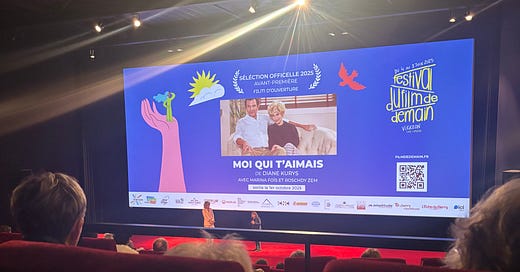Hello friends!
Last week, I had the immense privilege of attending the Festival du Film de Demain in Vierzon, France. If you haven’t heard of Vierzon, or you think I just misspelled Verizon, you would be in good company with many of the people that I’ve talked to in Paris. In fact, when I mentioned I was going to Vierzon for a film festival it was not uncommon for me to be met with “where’s that?” — even from my French friends.
Vierzon is a small town in the Berry region of France, about 1 hour and a half south of Paris. While the greater Loire Valley is known for its beautiful castles, Vierzon has a history as a hub of manufacturing and a seat of progressive ideals and union organizing. This makes it the perfect backdrop to host the Festival du Film de Demain.
Only 4 years old, Cannes it is not. It has yet to reach the level of notoriety that some other festivals have. So, how does a girl from Los Angeles find herself in a small town in France at a relatively small festival? This is the question I was asked almost daily throughout my 4 days in Vierzon.
To answer: Luck. I had been doing research about film festivals around Paris that met several criteria: 1) Not too expensive, 2) Not too far from Paris, and 3) Interesting themes.
This fit all three.
If the first two requirements made going to the festival possible, it was the third that really hooked me. For those who don’t speak French, Le Festival du Film de Demain translates to “The Festival of Films of Tomorrow”, and the festival mission is “to provide a space for inspiration and reflection, essential for imagining better tomorrows together and contributing to a more comprehensive and peaceful vision of the many issues that shape our daily lives.”
As the kids say. Say less. I’m there.
All of the films presented at the festival talked about some challenge facing society today: be it the realities of overworked hospital workers, the combat to preserve a cultural venue in a small town, the creation of co-living societies for people with handicaps, the fight against violence against women, the importance of adolescent mental health, or fighting the stigma of autism. Each film shined a light on the problems while at the same time offering hope for a brighter tomorrow. I rarely see 9 films in 4 days—and it is even rarer for me to be thoroughly moved by each one. Each filmmaker had something important to say and forced the audience to think, showcasing the people who are unafraid to stand-up in the face of injustice. To fight for what is right for humanity.
As I write this, my beloved city of Los Angeles has become the subject of national spotlight once again. Besieged by the fires earlier in the year, this time it is ICE who has infiltrated the city. But just as they did in January, Angelenos are coming together to care for their neighbors. As many of my friends still live in LA, I have seen countless videos of real-time protests — protests that are peaceful, strong in their convictions, and caring. In some, people are dancing and singing, expressing themselves in the best way they know how. They are making art in the face of fascism.
We are in an interesting moment of history — certainly in the United States, but there are reverberations of fights for human rights around the world. As someone who likes to see the glass half full, it’s hard to not feel overwhelmed by this moment, to feel like there’s no way out.
And that’s when I turn to art. Both the Festival du Film de Demain and the people using their voices and talents to protest give me hope for a brighter future. I’m not naive to the challenges facing our society today, but I am so proud to be among people who stand up and say “this is not right”. This has always been the role of artists — to challenge society and push us to a brighter future for everyone.
I left the festival last week more inspired than ever to create art and lift up voices that need to be heard. This week, my heart is with the LA community as they come together to protect their neighbors.
Let us all work for a brighter future together.
À la prochaine!
— Melanie




